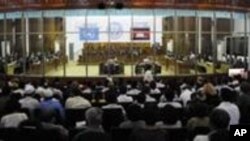With millions more dollars budgeted for the Khmer Rouge tribunal, at least some observers are questioning the value of the UN-backed court.
Donor countries have approved an $85 million budget for the next two years of the court, which has so far tried only one Khmer Rouge leader, the prison chief Kaing Kek Iev, or Duch.
The court is working toward its second trial, of five jailed leaders, but Jean-Michel Filipi, a French researcher who travels from province to province, told VOA Khmer the “immense” budget of the court is unlikely to produce revelations from those on trial.
Money could be better spent elsewhere, he said.
“Please look at the health care treatment for the old men who are accused,” he said. “They have access to health care that the Cambodian people the equivalent of 200 years in the future.”
Since 2003, Filipi has been asking Cambodians abut the tribunal.
“People in rural areas of the provinces are not interested in the trial of former Khmer Rouge leaders, and they do not have a culture of discussion” on the issue, he said.
The trial’s of those leaders in detention—Nuon Chea, Khieu Samphan, Ieng Sary, Ieng Thirith and Duch—are not on the minds of all Cambodians.
In 2009 the US-based International Republican Institute questioned 1,600 people in 12 provinces on their attitudes toward the tribunal. Of those, 82 percent were aware the tribunal, but 21 percent were not aware Duch was on trial at the time.
The budget for the tribunal far exceeds any money spent on Cambodia’s judiciary, which is widely perceived as corrupt, biased or ineffective.
“The government has provided $3 million for the function of the Ministry of Justice and for the courts across the country, for the Appeals Court, the Supreme Court and the Supreme Council of Magistracy,” said Long Panhavuth, a tribunal monitor for the Open Society Justice Initiative. “But there is $40 million a year for [tribunal] expenditure. It’s a big gap.”
Filipi said the “colossal” sum of money being spent on the tribunal should go toward agriculture, energy and education.
However, defenders of the tribunal say the court has to spend a lot of money because of its unique nature.
“You cannot compare the expenditure at the [tribunal] with the expenditure in a normal court in Cambodia,” said Lars Olsen, a spokesman for the court.
“First of all, the [tribunal] is doing a lot of work that normal Cambodian courts are not doing; for instance, the level of victim participation and the programs,” he said. “Secondly we have the outreach program, [including] bringing villagers from all across the country to Phnom Penh to watch the proceedings. These are things that are not happening in regular Cambodian courts.”
In addition, a third of the tribunal staff is international, requiring additional sums for salaries, he said. Where salaries run from $300 to $5,000 a month for Cambodians, based on their positions, costs for international staff can greatly exceed that.
The prosecution of crimes that took place 30 years ago is complex, requiring more resources, he said. “This court is not expensive.”




